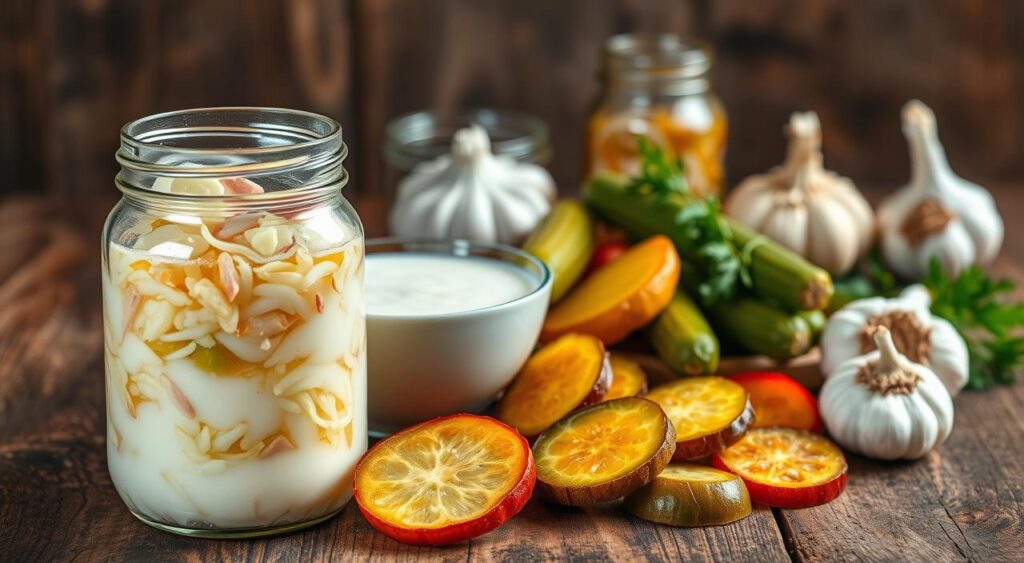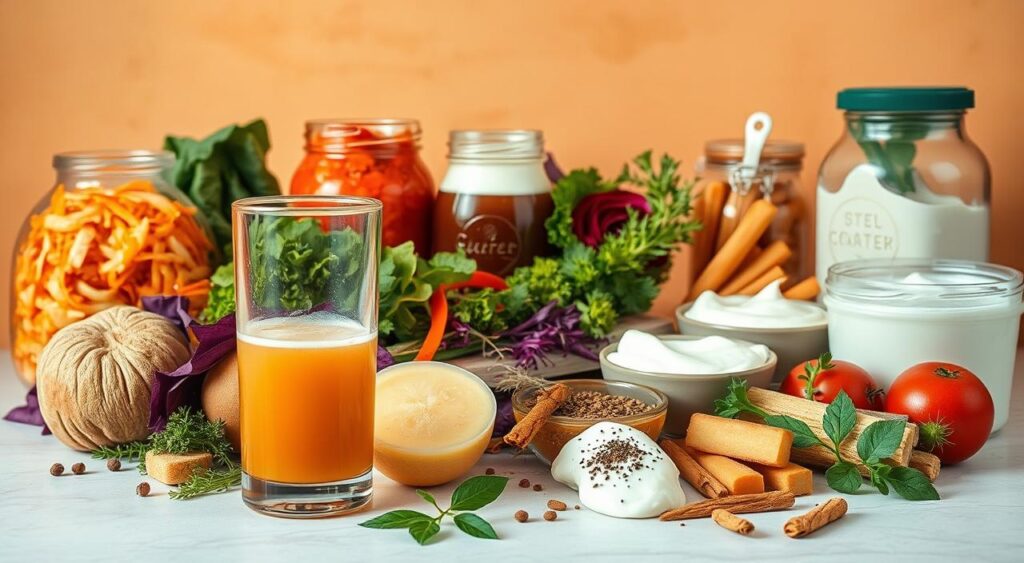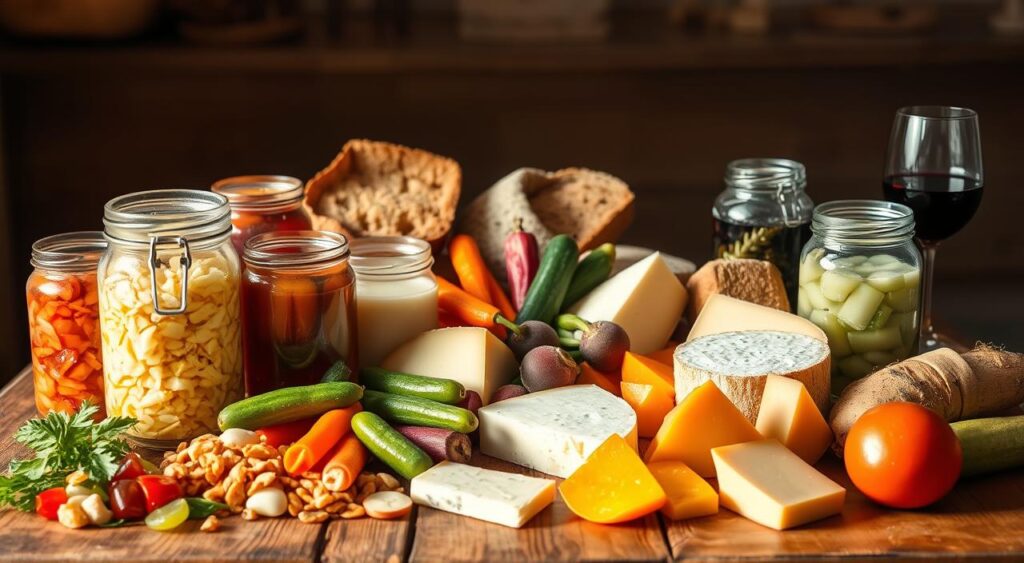Ever thought a simple yogurt bite or kombucha sip could boost your gut health? The right fermented foods can greatly improve your digestive wellness. These foods are packed with probiotics that help your body’s microorganisms work together.
When this balance is off, health problems can start. Adding foods like kimchi, kefir, and sauerkraut to your diet can help. They create a space for good bacteria to grow. Learn how these foods can change your gut health and how to add them to your meals.
If you want to know more about how these foods help your microbiome, check out this link: fermented foods and gut microbiome.
Understanding the Gut Microbiome
The gut microbiome is a huge community of bacteria, viruses, and fungi. They are key to keeping you healthy. Living in your digestive system, they help with many important functions. A healthy gut microbiome boosts your digestive health and overall wellness.
What is the Gut Microbiome?
The gut microbiome is the trillions of tiny life forms in your intestines. This complex group is vital for many things. They help break down food, make vitamins, and keep your immune system in check. The types and numbers of these microorganisms change based on your diet, genes, and lifestyle.
Why is It Important for Your Health?
Your gut microbiome greatly affects your health. About 70% of your immune system is in your gut. This shows how critical it is for your body to work right. A balanced gut helps you digest food better and prevents stomach problems.
An unbalanced gut can cause discomfort and serious health issues. So, keeping your gut microbiome healthy is essential for your well-being.
Benefits of Fermented Foods for Gut Health
Fermented foods are great for your gut health. They help grow good bacteria in your gut. This is because they are full of probiotics, which are live helpers for your body.
Eating these foods can make your digestion better. You’ll also absorb more nutrients and have a balanced gut. Knowing how these foods work and what they offer can help you choose better foods.
How Fermented Foods Affect Your Microbiome
Adding fermented foods to your diet helps grow good bacteria in your gut. This is key for a healthy gut. Foods like yogurt, kimchi, and kefir bring in different probiotics.
These probiotics help digest food and fight off bad bacteria. This can make symptoms like bloating and irritable bowel syndrome better.
Key Nutrients in Fermented Foods
Fermented foods are not just about probiotics. They also have vitamins, enzymes, and other good stuff. These help your body use nutrients better.
Many of these foods also have prebiotics. Prebiotics feed the probiotics, keeping your gut healthy. This is good for your digestion.

| Type of Fermented Food | Probiotic Content | Key Nutrients |
|---|---|---|
| Yogurt | High | Calcium, Vitamin B12, Probiotics |
| Kefir | Very High | Calcium, Magnesium, Probiotics |
| Kraut | Moderate | Vitamin C, K, Probiotics |
| Kimchi | High | Vitamins A, C, K, Probiotics |
| Kombucha | Moderate | Vitamins B, C, Organic Acids |
Top Fermented Foods to Include in Your Diet
Adding fermented foods to your diet can boost your health. They are full of probiotics and nutrients that help your gut and digestion. Yogurt, sauerkraut, and kombucha are some of the best choices because of their unique benefits and tastes.
Yogurt and Its Probiotic Power
Yogurt is famous for its probiotics, like Lactobacillus bulgaricus and Streptococcus thermophilus. These good bacteria help with digestion, boost immunity, and keep your gut healthy. You can enjoy yogurt in smoothies, on fruit, or by itself, making it easy to add to your diet.
Sauerkraut: A Tangy Gut Booster
Sauerkraut, made from fermented cabbage, is full of vitamins C and K and good bacteria. It adds a tangy crunch to salads, sandwiches, or as a side. Eating sauerkraut regularly can make your digestive system healthier and add a zesty flavor to your meals.
Kombucha: A Fizzy Fermented Tea
Kombucha is a fizzy, fermented tea that’s a great alternative to sugary drinks. It’s packed with live cultures, antioxidants, and acids that support your digestive health and overall well-being. You can drink it on its own or mix it into cocktails for a fun, healthy twist.

The Role of Probiotics in Gut Restoration
Probiotics are key to your health and wellness. They help restore your gut by improving its microbiome’s diversity and function. You can find them in foods like yogurt, kimchi, and sauerkraut. Knowing about probiotics and their role in your gut health can guide your diet choices.
What Are Probiotics?
Probiotics are good bacteria in your gut. They aid digestion and keep your microbiome balanced. You can get them from food or supplements. They’re important for a healthy gut, as they fight off bad bacteria.
How Probiotics Interact with Your Microbiome
Probiotics do many good things for your gut. They strengthen the gut barrier, keeping harmful pathogens out. They also boost microbial diversity, making your gut stronger. This balance is key for nutrient digestion and immune support.
They may also improve mood and brain function. This shows their role in overall health.

How to Incorporate Fermented Foods into Your Meals
Adding fermented foods to your meals is easy and rewarding. They add unique flavors and boost your gut health. Start by adding fermented ingredients to your daily dishes. With a bit of creativity, you can make traditional recipes healthier.
Easy Recipes with Fermented Ingredients
Begin with simple recipes that highlight fermented foods. Blend yogurt or kefir into smoothies for a probiotic-rich start. Try overnight oats with fermented fruit preserves for a twist on a classic.
For lunch, add sauerkraut to sandwiches or salads for extra crunch and tang. Make a simple miso soup with miso paste, broth, and veggies for a warm, gut-friendly meal.
Snacks and Side Dishes Using Fermented Foods
Enjoy kombucha as a fizzy, healthy drink instead of soda. Kimchi can add zest to meals or top rice bowls. Mix diced pickles, carrots, and beets for a colorful, probiotic-rich salad.
As you try these recipes, mix different flavors to enhance your meals and gut health.
Potential Side Effects of Fermented Foods
Fermented foods are good for your gut health but might cause side effects for some. It’s important to know how your body reacts, mainly if you’re sensitive. Start with small amounts to see how you do and avoid discomfort.
Understanding Your Body’s Response
Your body might react differently to fermented foods. You might feel bloated, gassy, or have an upset stomach. This can happen, mainly if you eat too much at once. Listen to your body and adjust how much you eat to improve your gut health slowly.
When to Limit Fermented Foods
Even though fermented foods are great for your gut, there are times to eat less. If you have stomach problems or are very sensitive, talk to a doctor before adding them to your diet. Watch how your body reacts to find the right amount for you.

Fermented Foods vs. Probiotic Supplements
Fermented foods and probiotic supplements are both popular for improving gut health. They aim to boost your microbiome but in different ways. Knowing the differences can help you choose what’s best for you.
Comparing Effectiveness
Fermented foods, like yogurt and sauerkraut, have many bacterial strains and nutrients. They provide natural probiotics and other nutrients that help your gut. This combination supports your digestive system well.
Probiotic supplements, on the other hand, have specific strains of bacteria. They might not offer the same variety as whole foods. While they can help with certain health issues, they lack the nutrients found in fermented foods. Research shows that whole foods are better for gut health.
Which is Right for You?
Deciding between fermented foods and probiotic supplements depends on your health goals and diet. Fermented foods are great for a varied diet and taste good. They also support gut health.
Probiotic supplements are useful when you can’t get enough from food or have specific health needs. They’re easy to take, even when you’re busy or traveling.
| Criteria | Fermented Foods | Probiotic Supplements |
|---|---|---|
| Diversity of Strains | High | Lower |
| Nutritional Benefits | Rich in nutrients | Specific strains only |
| Convenience | Requires meal prep | Easy to take on the go |
| Taste & Variety | Flavorful options | Neutral or capsules |
Listening to your body will help you make the right choice. Mixing fermented foods and probiotic supplements in your diet can be the best approach. It can help you achieve better gut health.
Fermented Foods from Around the World
Exploring international fermented foods opens up a world of unique flavors and health benefits. Many cultures have their own fermented products. These add variety to your diet and offer health perks from different bacteria.
Traditional Fermented Foods You’ve Never Tried
Tempeh from Indonesia and kimchi from Korea are just the start. Tempeh, made from soybeans, is full of protein and flavor. Kimchi, a spicy veggie mix, boosts gut health.
In India, fermented dairy like buttermilk and lassi aid digestion. They’re refreshing on hot days.
Exploring Flavorful International Options
Kvass, a fermented rye bread drink from Eastern Europe, is another treat. Each food brings its own taste and texture. Adding them to your meals brings joy and health benefits.
These foods can mix and match, showing off a wide range of tastes and textures. They also help your gut health. For more on these benefits, check out this informative article.
Creating a Balanced Diet with Fermented Foods
Eating a balanced diet with fermented foods can greatly improve your health. It’s important to know the right amounts and mix of nutrients. Adding different fermented foods to your meals can make them healthier and more enjoyable.
Portion Sizes to Consider
When adding fermented foods to your diet, choose the right amounts. Experts say to eat a serving a few times a week. Here’s what that might look like:
| Fermented Food | Recommended Portion Size |
|---|---|
| Yogurt | 1 cup |
| Sauerkraut | 1/2 cup |
| Kombucha | 8 ounces |
Combining Fermented Foods with Other Nutrients
To make your diet even better, mix fermented foods with fiber-rich foods. Add vegetables, fruits, whole grains, and lean proteins. This mix not only helps your gut but also makes digestion better. Try these ideas:
- Yogurt parfaits with fruits and nuts
- Sauerkraut on whole-grain sandwiches
- Kombucha with colorful vegetable stir-fries
These combinations give you a wide range of nutrients. They support your health and a healthy gut.
Tracking Your Gut Health Progress
Watching how your gut health changes after eating fermented foods can help you make better food choices. You might see signs like better digestion and feeling more well. These signs can show if your diet changes are working.
Signs of Improvement After Adding Fermented Foods
Look out for these signs after you start eating fermented foods:
- Less bloating and discomfort
- More regular bowel movements
- More energy
- Better mood
- Healthier-looking skin
Noticing these changes can help you see how your diet is improving. Keeping track of these changes can really help you understand how your gut is reacting.
How to Monitor Your Microbiome Changes
Keeping a food diary can help you track your meals and any gut health changes. It’s a good idea to note:
- What fermented foods you eat and how often
- Your symptoms before and after eating these foods
- Any changes in mood, energy, or digestion
Also, think about using home microbiome testing kits. These tests can show you changes in your gut’s bacteria. This info can help you make your diet even better. For more on this topic, check out gut health breakthroughs and how they might change your diet.
Expert Tips for Choosing Quality Fermented Foods
Improving your gut health starts with the right fermented foods. It’s important to read labels and nutritional info carefully. Look for products with live and active cultures for probiotic benefits. Also, avoid foods with added sugars or preservatives.
Reading Labels and Nutritional Information
Reading labels helps you find better options. Choose fermented foods with many probiotic strains for a diverse gut microbiome. “Naturally fermented” products usually have more beneficial microbes for your gut.
Understanding Fermentation Processes and Ingredients
Knowing how fermented foods are made helps you make better choices. Pick brands that focus on high-quality, minimally processed foods for the best nutrition. Whether it’s yogurt, kimchi, or kombucha, knowing the ingredients helps you meet your health goals.




Pingback: Prebiotics vs Probiotics: Key Differences + Best Sources